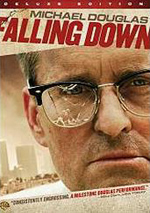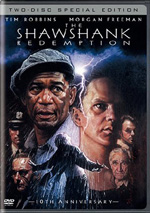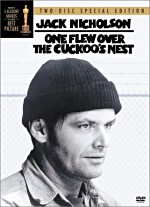|
WARNER
|

| |
|
MOVIE INFO
|
|
Director:
Joel Schumacher
Cast:
Michael Douglas, Robert Duvall, Barbara Hershey, Tuesday Weld, Rachel Ticotin, Frederic Forrest, Lois Smith
Writing Credits:
Ebbe Roe Smith
Tagline:
The adventures of an ordinary man at war with the everyday world.
Synopsis:
A laid-off defense worker, kept from seeing his child on her birthday by a restraining order, looks at the landscape of moral decay in Los Angeles on one hot, congested day and, after being mugged, snaps. What follows is his bitter and pathetic mission of justice, vengeance and vindication that reads uncomfortably like too many news stories. Michael Douglas is identified only by his character's license plate, D-FENS, in this attack on social ills, a film originally seen as the displacement of power felt by many white American males.
Box Office:
Budget
$25 million.
Opening Weekend
$8.724 million on -unknown- screens.
Domestic Gross
$40.903 million.
MPAA:
Rated R
| |
|
DVD DETAILS
|
Presentation:
Widescreen 2.35:1/16X9
Audio:
English Dolby Surround 2.0
French Dolby Surround 2.0
Subtitles:
English
French
Closed-captioned
Supplements Subtitles:
None
Runtime: 112 min.
Price: $19.97
Release Date: 5/26/2009
Bonus:
• Audio Commentary with Director Joel Schumacher, Editor Paul Hirsch, Screenwriter Ebbe Roe Smith, LA Times Writer Shawn Hubler, and Actors Michael Douglas (circa 1993), Michael Paul Chan, Vondie Curtis-Hall, and Frederic Forrest.
• ďA Conversation with Michael DouglasĒ Featurette
• Theatrical Trailer
| |
|
PURCHASE @ AMAZON.COM
|

| |
|
EQUIPMENT
|
Panasonic 50" TH-50PZ77U 1080p Plasma Monitor; Sony STR-DG1200 7.1 Channel Receiver; Panasonic DMP-BD60K Blu-Ray Player using HDMI outputs; Michael Green Revolution Cinema 6i Speakers (all five); Kenwood 1050SW 150-watt Subwoofer.
| |
|
RELATED REVIEWS
|


| |
[an error occurred while processing this directive]
|
Falling Down: Deluxe Edition (1993)
|
|
Reviewed by Colin Jacobson (March 15, 2009)
While best known for ďstyle over substanceĒ flicks like The Lost Boys and Batman and Robin, director Joel Schumacher occasionally attempts something a little darker and more serious. In that vein, he created 1993ís Falling Down, a tale of urban anxiety.
Bill Foster (Michael Douglas) leads a quiet life, but he grows increasingly fed up with the little bits of indignation he seems to endure on a daily basis. When he feels pushed too far, he finally snaps. Stuck in one of LAís patented never-ending traffic jams, Foster abandons his car on the freeway and declares heís going home.
We follow his rather circuitous, confrontational path. First Foster gets into a tussle with a Korean convenience store owner (Michael Paul Chan) who he feels overcharges for his goods. Foster then runs into some Latino gang-bangers and chases them off with the baseball bat he took from the Korean store. Fosterís escapades escalate in intensity and violence as he works his way toward the home of his ex-wife Beth (Barbara Hershey) even though she has a restraining order out on him.
Along the way, a soon-to-retire cop named Prendergast (Robert Duvall) gets involved. During his last day on the job, he sees a thread among the various incidents that comes to the attention of the police. He pursues these leads and tries to stop Foster before matters go over the top.
When Falling hit in 1993, it caused quite a stir. After all, it appeared less than a year after the LA riots that greeted the Rodney King verdict, so it seemed awfully timely. Falling doesnít directly tap the same subject matter; the LA riots were more firmly connected to racial injustice, while the film visits the degeneration of society in a more general way. Oh, we occasionally get a sense of Foster as a racist, but I donít think that perception is accurate. Like John Doe from Se7en, heís more concerned with the actions of the various folks than he is their skin color.
Still, thereís the same sense of the social tension that came to the fore in April 1992, so Falling connects with its era. 16 years later, it still feels timely; after all, itís not like the world has suddenly become a happier, sunnier place. If anything, people have become ruder and more self-absorbed over that period, as cell phones and iPods allow folks to dig even deeper into their own little cocoons.
A more skilled director couldíve really explored this territory in a satisfying way, but Schumacher is too superficial. He prefers bits of cheap symbolism. For instance, during the tussle at the Korean convenience store, the participants knock a jar of little American flags to the floor; it breaks and spills the flags on the ground. This kind of imagery seems obvious and tacky; it doesnít add anything to the film and simply distracts us.
More problematic, however, is Schumacherís inability to find a consistent tone for the movie. He doesnít seem sure if he wants this to be a harrowing journey into madness or a light spoof of societal rudeness. The film takes itself too seriously to become a satire, but itís too silly for the audience to buy it as a realistic drama.
Maybe Schumacher thought he needed some light moments to temper the tension, but most of those bits just feel out of place. Take the scene at the burger joint. The employees wear goofy hamburger hats that distract us because theyíre unrealistic Ė Iíve never seen silly caps like that at any fast food place Ė and dopey. It feels like the art director got to him and they went with the easy laugh instead of the realism.
Again, if the movie went down a more consistently satirical path, bits like that would be acceptable. Or the scene with the panhandler who canít do anything right. Címon Ė whoís dumb enough to claim he hasnít eaten in days when he has a hamburger in his hand? The movie jumps from darkness to light comedy in the blink of an eye, and all those shifts undercut the various elements.
But Schumacher was never one for subtlety. In the filmís world, everyone reinforces his point. Funny how everyone Foster encounters is so intensely rude; wouldnít you think heíd occasionally run into someone who doesnít act like a total jerk? But thatíd undercut the flickís theme, and Schumacher canít allow anything to interfere with his one-dimensional portrayal of events.
At least the actors bring some depth to the material. Foster is essentially a caricature of the Angry White Man, but Douglas makes him borderline sympathetic. Heís too nuts and too cruel to become a likable character, but at Douglas ensures that he isnít just a cartoon.
Duvall brings the most verve to the movie. He gets an underdeveloped character, and the arc with his needy, pushy wife seems unnecessary; poor Tuesday Weld is stuck with the role as the harpy who controls him, and I think the movie would be better without her. Prendergastís tale works just fine without her intrusions, and Duvall adds a lot of verve to his take on the role.
Falling Down remains an interesting movie despite its flaws. While a different filmmaker couldíve made something great out of it, I will acknowledge that itís still more than watchable under Schumacherís direction. Nonetheless, I canít help but view it as a missed opportunity and a movie that couldíve been much more dynamic with a more skilled storyteller behind the camera.
|
The DVD Grades: Picture B+/ Audio B/ Bonus B-
|
|
Falling Down appears in an aspect ratio of approximately 2.35:1 on this single-sided, double-layered DVD; the image has been enhanced for 16X9 televisions. We get a good catalog transfer here.
Sharpness appeared quite positive most of the time. Wide shots tended to become a smidgen ill-defined, but not with consistency. Instead, the majority of the flick provided good clarity and accuracy. I saw no issues with jaggies or edge haloes, but a little light shimmering crept into the presentation on a few occasions. Source flaws were insubstantial. I noticed a handful of small specks but that was it.
The palette of Falling Down went with a sensibility to match its stressful environment. This meant a generally arid set of colors that reflected a sweltering day and an intense mindset. Within those parameters, the colors worked well. Blacks seemed dark and tight, and shadows presented good delineation. Overall, this was a quality transfer.
I also thought the Dolby Surround 2.0 soundtrack of Falling Down fit the film. While the story didnít provide a vast number of active scenes, it went with an oppressive tone to match the material. This meant environmental material that created a feeling of tension. A few sequences came across as a bit more involving Ė such as a drive-by shooting Ė but most stay in the realm of ambience. These work fine, and the score showed nice stereo information
Audio quality always satisfied. A little edginess occasionally affected speech, but the lines were usually natural and distinctive. Music showed nice range and definition, while effects were clear and concise. The louder bits demonstrated decent bass response. Nothing here dazzled, but the track was perfectly satisfactory.
In terms of extras, we open with an audio commentary from director Joel Schumacher, editor Paul Hirsch, screenwriter Ebbe Roe Smith, LA Times writer Shawn Hubler, and actors Michael Douglas (circa 1993), Michael Paul Chan, Vondie Curtis-Hall, and Frederic Forrest. The commentary compiles a bunch of separate interviews and mixes them into this edit piece. The track looks at themes and characters, the filmís tone, story, script and development, cast and performances, editorial choices and the approach to the material, LA locations and the cityís climate in the early 90s, and a few production tidbits.
Despite the presence of so many participants, the commentary suffers from a surprising amount of dead air. Oh, you wonít find acres of space, but matters go silent more often than Iíd expect. Nonetheless, we get a fairly good look at the film here. Story/character notes come to the fore, and the actors contribute nice insights. Thereís enough useful information to make this one worth a listen.
In addition to the filmís theatrical trailer, we get a featurette. Deconstructing D-FENS: A Conversation with Michael Douglas runs 10 minutes, 11 seconds and includes the actorís thoughts about the project and why he took it, his character and performance, the filmís use of LA, and his impressions of some specific scenes. Douglas provides a fairly introspective take on the flick and his involvement in it.
Some directors elevate material, while others take potentially great work and make them ordinary. Joel Schumacher falls into the latter category, and he ensures that Falling Down never lives up to its potential. The movie entertains and keeps us occupied, but it suffers from too many flaws to even flirt with greatness. The DVD provides very good picture, solid audio and a few interesting extras. Iím not wild about the film itself, but the DVD presents it well.
|
|
[an error occurred while processing this directive]
|
|

